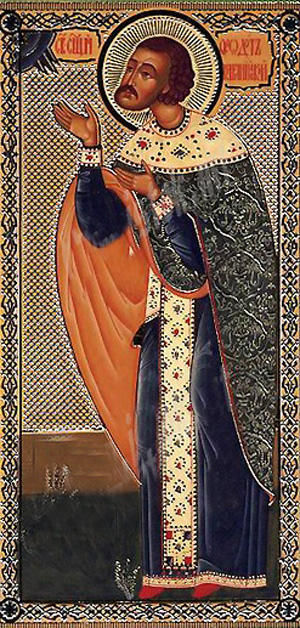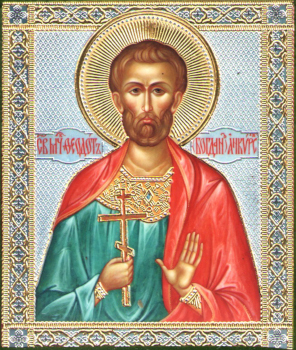
Today is the feast day of St. Theodotus, who was also known as St. Theodotus of Ancyra (c. 303 C.E.). He was a fourth-century Christian martyr, along with the “saintly virgins” who were Thecusa, his aunt, Alexandra, Claudia, Faina, Euphrasia, Matrona and Julitta, among others, and collectively their feast day is today, although there is also a separate one for Theodotus on June 7. He is the patron saint of innkeepers, because he owned and operated an inn in Ancyra, the capital of the Roman province of Galatia.

Here’s what we know of him, from Wikipedia:
On 18 May, the Roman Martyrology says: “At Ancyra, in Galatia, the martyr Saint Theodotus and the saintly virgins Thecusa, his aunt, Alexandra, Claudia, Faina, Euphrasia, Matrona and Julitta,” etc. They are mentioned in all the menologies, and Theodotus has a special feast on 7 June.
According to the Acts (Acta Sanctorum, May, IV, 147), Theodotus was a married man who kept an inn at Ancyra, the capital of the Roman province of Galatia. He is described as a man very zealous in the performance of his Christian duties, endowed with many virtues, especially charity towards his neighbour, bringing sinners to repentance and strengthening many in their faith during the persecution which the Roman governor Theoctenus was carrying on in the province, about 303, in accordance with the imperial edict of Diocletian.
The name of a certain Victor is mentioned as one who grew weak in his profession of Christianity and received much encouragement from Theodotus. Theoctenus ordered that all provisions exposed for sale should first be offered to the idols. Theodotus laid in stores of goods, and his house became a refuge for the Christians, a hospital for the sick, and a place for Christian worship.
At Malos, about five miles from Ancyra, he sought out the body of the martyr, Valens, and gave it a Christian burial. Returning to Ancyra, he found the Christians in great trouble. The seven virgins mentioned above had been called before the judges and made a valiant profession of their faith; they were then sent to a house of debauchery, but preserved their purity. Then they were obliged to suffer cruel torments, and were cast into the sea with stones attached to their bodies.
According to legend, Theodotus succeeded in retrieving the bodies and honourably burying them. In consequence, he was arrested, and, after many sufferings, was killed by the sword; his body was miraculously brought to Malos and there entombed by the priest, Fronto. A chapel was built over the grave, and the saint was held in great veneration.

And this account is from the Catholic Encyclopedia:
On 18 May the Roman Martyrology says: “At Ancyra, in Galatia, the martyr Saint Theodotus and the saintly virgins Thecusa, his aunt, Alexandra, Claudia, Faina, Euphrasia, Matrona, and Julitta”, etc. They are mentioned in all the menologies, and Theodotus has a special feast on 7 June (Nilles, “Kal. man.”, I, 162, and II, 583). He is patron of innkeepers. Emblems: torches and the sword. According to the Acts (Acta SS., May, IV, 147) Theodotus was a married man who kept an inn at Ancyra, the capital of Galatia. He is described as a man very zealous in the performance of his Christian duties, endowed with many virtues, especially charity towards his neighbour. He brought sinners to repentance and strengthened many in their faith during the persecution which Theoctenus, the governor of the province, was carrying on, about 303, in accordance with the edict of Diocletian. The name of a certain Victor is mentioned as one who grew weak in his profession of Christianity and received much encouragement from Theodotus. The governor ordered that all provisions exposed for sale should first be offered to the idols. Theodotus laid in stores of goods and his house became a refuge for the Christians, a hospital for the sick, and a place for Divine worship. At Malos, about five miles from Ancyra, he sought out the body of the martyr, Valens, and gave it Christian burial. Returning to Ancyra he found the Christians in great trouble. The seven virgins mentioned above had been called before the judges and made a valiant profession of their faith; they were then sent to a house of debauchery, but preserved their purity. Then they were obliged to suffer cruel torments and were cast into the sea with stones attached to their bodies. Theodotus succeeded in rescuing the bodies and honourably burying them. In consequence he was arrested, and after many sufferings was killed by the sword; his body was miraculously brought to Malos and there entombed by the priest Fronto. A chapel was built over the grave, and the saint was held in great veneration. The legend is told by Nilus who claims to have been an eye-witness to a great part of what he describes. Ruinart (page 372) places it among his “Acta sincera et selecta”. Pio Franchi produced a critical edition of the Acts in “Studi e Testi” (Rome, 1901). He considered them trustworthy, but later changed his opinion. Delehaye (Anal. Boll., XXII, 320, and XXIII, 478) says: “The kernel of the legend is a tale narrated by Herodotus, while the existence of the hero of the narrative is not vouched for by any historic document.”

And this short story is from Catholic Online:
Martyr with Thecusa, Alexandra, Claudia, faina (Phaina), Euphrasia, Matrona, and Julitta during the persecutions of Emperor Diocletian. Theodotus was an innkeeper at Ancyra, Galatia (modern Turkey), who gave burial to seven virgins after their martyrdom for refusing to wear pagan priestess robes and take part in a pagan festival. Theodotus was himself betrayed by an apostate and was martyred. In turn, his remains were gathered up by a Christian and sent to Malus where they received a proper burial and were enshrined in a chapel. This martyrdom is suspect and is believed to be a morality tale.

